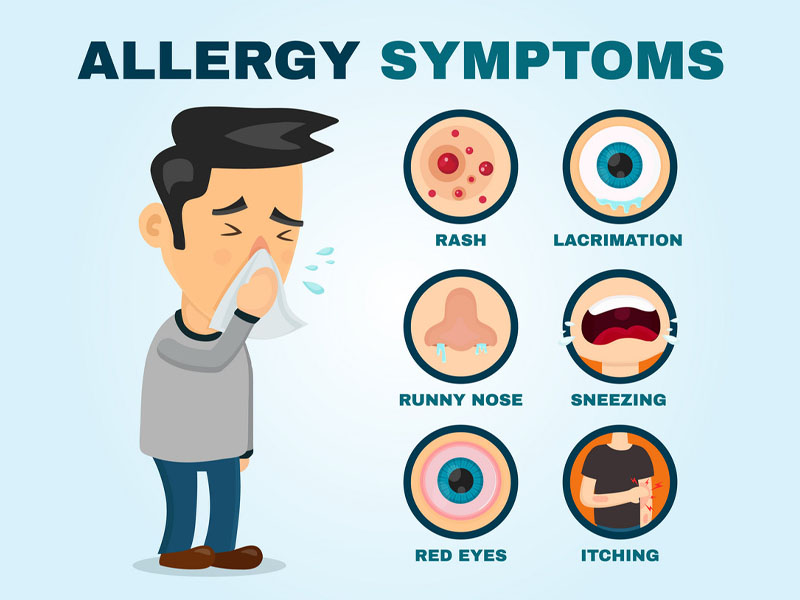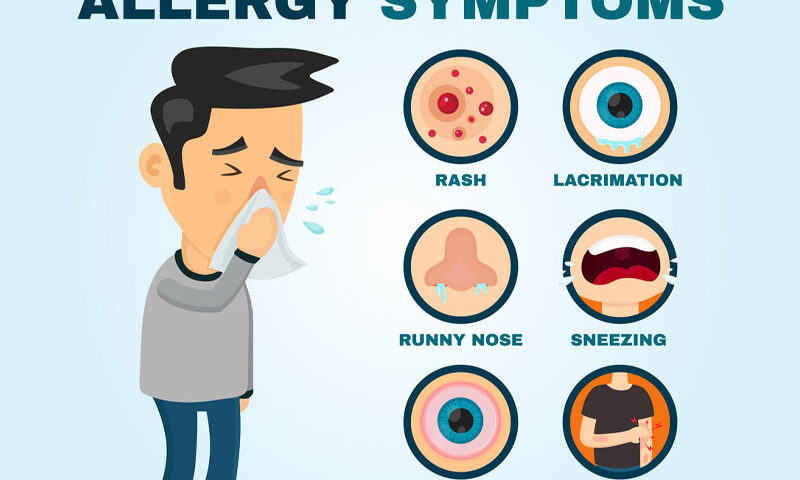Ayurvedic Treatment For Allergies
Ayurvedic Treatment for Allergies
Allergies are a common health concern affecting millions of people worldwide. An allergic condition occurs when the body's immune system overreacts to certain substances known as allergens, perceiving them as harmful invaders. These allergens could be anything from pollen, dust mites, pet dander, certain foods, to various environmental factors. When the immune system reacts to these substances, it triggers a range of symptoms and discomforts, varying from mild to severe.

Understanding Allergic Conditions
Allergic conditions are a result of the body's immune system misidentifying harmless substances as threats. The immune system releases chemicals such as histamine, causing the symptoms we commonly associate with allergies. The severity of the reaction depends on individual sensitivity and the type of allergen encountered.
Etiological Factors of Allergy Conditions
The exact causes of allergies are not fully understood, but several factors may contribute to their development. Genetic predisposition plays a significant role; if someone in the family has allergies, there's a higher likelihood of others experiencing them too. Environmental factors, exposure to pollution, lifestyle choices, and even early childhood exposure to allergens can also influence the development of allergies.
Symptoms of Allergy Conditions
Allergy symptoms can manifest in various ways, affecting the respiratory system, skin, digestive system, and more. Common symptoms include sneezing, nasal congestion, itching, hives, rashes, watery eyes, coughing, wheezing, and stomach discomfort. In severe cases, allergies can lead to anaphylaxis, a life-threatening allergic reaction that requires immediate medical attention.
Types of Allergy Conditions
Allergies come in different forms, affecting people differently. Some of the most common types of allergies include:
- Respiratory Allergies: Triggered by airborne allergens like pollen, dust mites, mold spores, and pet dander.
- Food Allergies: Caused by certain foods such as nuts, dairy, eggs, shellfish, and gluten.
- Skin Allergies: Evident through skin reactions like hives, eczema, and contact dermatitis.
- Insect Sting Allergies: Resulting from insect stings or bites, like those from bees, wasps, or ants.
Complications in Allergy Conditions
Untreated or severe allergies can lead to various complications. Chronic respiratory allergies can contribute to asthma, while untreated food allergies may lead to malnutrition or anaphylaxis. It's crucial to address allergies promptly to avoid long-term complications.
Ayurvedic Concept with Management of Allergy Conditions
In Ayurveda, allergies are understood as imbalances in the body's doshas, particularly the accumulation of toxins (ama) and aggravated immune responses. Ayurvedic practitioners aim to balance the doshas through personalised treatments, focusing on pacifying the aggravated dosha and eliminating ama from the body.
Precautions to Avoid Aggravating Allergy Conditions
Preventing allergies involves managing exposure to allergens. Ayurvedic recommendations include:
- Environmental Care: Keeping living spaces clean, free of dust, mold, and pollen.
- Dietary Measures: Avoiding known allergenic foods and consuming a balanced diet suitable for one's dosha.
- Lifestyle Adjustments: Implementing healthy routines, exercise, and stress management techniques to boost immunity.
Diet and Lifestyle in the Treatment of Allergy Conditions
Ayurveda emphasises the role of diet and lifestyle in managing allergies. Allergy treatment in Ayurveda, a balanced diet tailored to individual needs can help strengthen the immune system and reduce sensitivity to allergens. Specific lifestyle practices like daily exercise, yoga, meditation, and sufficient rest contribute to overall well-being and better management of allergies.
Ayurvedic Herbal Remedies for Allergies
Ayurvedic herbs play a significant role in managing allergies. They are known for their natural healing properties and ability to strengthen the body's immunity. Ayurvedic practitioners may recommend specific herbal formulations tailored to individual needs to address allergic symptoms effectively.
Ayurvedic Therapies for Allergy Conditions
Ayurvedic therapies can complement the management of allergy conditions. Therapies like Panchakarma, Nasya (nasal administration of medicated oils), and Abhyanga (oil massage) can help in eliminating toxins, improving respiratory health, and enhancing overall well-being.
Conclusion
At Ayur Healthcare, located in Parramatta Sydney, we believe in a holistic approach to manage allergies. Our Ayurvedic practitioners offer personalised treatments, combining diet, lifestyle modifications, herbal remedies, and therapies to address the root cause of allergies. However, it is essential to note that the content provided on this website is for educational purposes only and should not be considered medical advice or a substitute for professional healthcare. Individual results may vary, and we strongly advise consulting qualified healthcare practitioners for personalised treatment plans. The practitioners at Ayur Healthcare can provide their best efforts and offer Ayurvedic treatments based on their abilities, but we make no claims of curing conditions.




